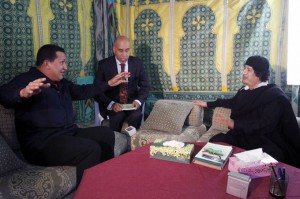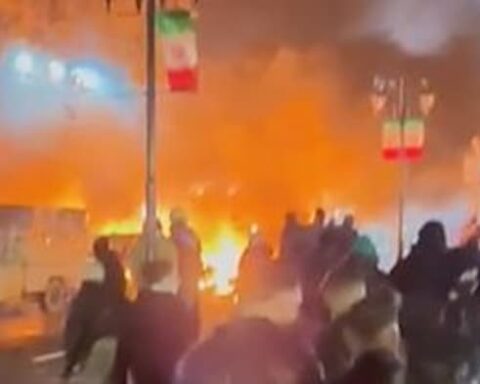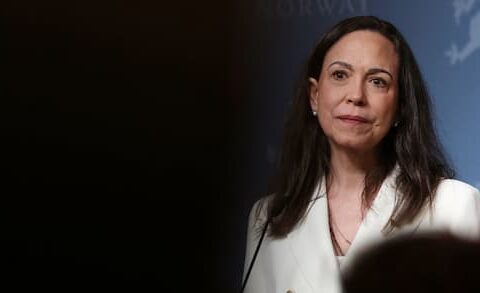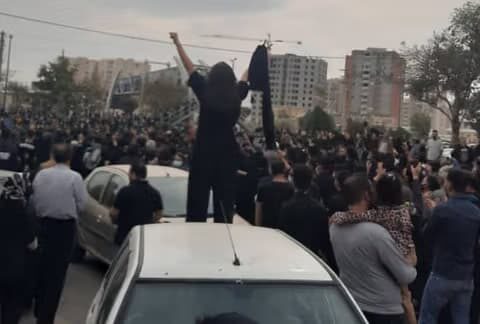Watching news coverage of events in Venezuela, you would be forgiven for thinking you’d been transported back in time to the Arab Spring – except this is happening on the other side of the globe.
But almost all of what appears to be happening in the Latin American country seems to be resemble a carbon copy of what transpired in Libya in 2011. The parallels are obvious; but I will point out some specifics where appropriate.
Which is not to portray Venezuelan President Nicolas Maduro as any kind of angel or to absolve his government of any responsbility for the problems in Venezuela. But we should always be guarded when the mass media decides to start covering ‘protests’ on the other side of the world and does so with a clear bias, indicating a prefabricated agenda.
I recommend reading Wall of Controversy’s excellent piece on this subject here. As he notes, ‘The media has its blinkers firmly attached whenever exalting those in opposition to a targeted ‘regime’. ‘Rioters’ become more benign ‘protesters’, and ‘insurgents’, ‘separatists’ or ‘terrorists’ are elevated to the level of ‘freedom fighters’…’
Caracas and other Venezuelan cities have been subject to violent protests and unrest for some months now. The UN’s’ human rights office reported earlier this month that Venezuelan security forces had used excessive force and arbitrarily detained thousands of people, with various figures being thrown around about how many people have been killed.
I can’t – and most of us can’t – make any comment about those figures or the claims. I will assume they’re true. And I suspect that the government in Venezuela has been guilty of excesses and some behaviour that we would generally consider bad.
But this all does seem to have Arab Spring written all over it. Mass protests and rioting, some of which is probably motivated by genuine (or justified) dissatisfaction, but some of which could essentially be anyone.
If there’s one thing we’ve learnt in the modern age, it’s that we cannot trust our media organisations to be impartial or even honest when it comes to geopolitics.
It’s suspicious that international media has invariably portrayed the protesters in almost angelic terms, just as was done with protests in Libya and then Syria in early 2011; and like Gaddafi or Assad, Maduro is often being portrayed as a brutal dictator.
As was his predecessor, Hugo Chavez; some of that might (or might not) have some truth to it – but that is somewhat irrelevant at this point.
I don’t at all refute the validity of the protests or the sincerity of the vast majority of protesters – all of whom have a great deal to be protesting about.
But, with that being understood, we have no way of knowing what kinds of elements, infiltrators or agents are embedded with the protesters or within the unrest – seeking to guide or co-opt the public malaise.
And it isn’t just street protests.
In Libya, the tell-tale signs emerged when armed individuals began attacking government buildings. In Libya, this happened in the very first days of the ‘protests’, which revealed very early on that the international narrative was omitting key details.

In Venezuela, it arguably hasn’t been so obvious.
However, a police helicopter launched grenades at Venezuela’s supreme court building and the helicopter attack was cited by government sources as having been organised by the CIA and the US Embassy. So there clearly is armed violence against the government accompanying the unrest.
While Western corporate media outlets continue to cite the many deaths from the unrest, what isn’t always clear (though you wouldn’t know it from the coverage) is who it is that’s doing the killing.
Western platforms invariably attribute it to Maduro’s government or security forces, but – as in Libya – there are counter-claims of deaths being caused by the opposition, as well as evidence of mysterious snipers.
The possible presence of vague, unspecified gunmen acting as possible agent-provocateurs is highly reminiscent of events in Ukraine in 2014 and Syria in 2011 and 2012.
Of course, we don’t even need to consult Libya or Syria: we already have recent history in Venezeula to draw from.
In 2002 the Bush administration was caught red-handed in a plot with the wealthy and upper middle classes of Venezuela to overthrow Hugo Chavez in a coup.
Chavez was kidnapped, held at an American military facility and Washington decided to immediately legitimise the coup. Again, I recommend reading Wall of Controversy’s excellent post on this subject here.
As he reminds us, a 2003 documentary entitled The Revolution Will Not Be Televised provides insight into the American-orchestrated coup of 2002. What was fascinating in that instance was the the Irish filmmakers had been in Venezuela to make a documentary on Chavez – only to find themselves caught up in the turmoil of the coup attempt.
As Wall of Controversy also points out, CIA head Mike Pompeo seems to have admitted in an interview that US is engaged in a covert regime-change programme in Venezuela.
Whatever the pros and cons of Maduro’s government or of the Socialist system in Venezuela, it is highly likely that what’s going on in Venezuela is another US attempt at ‘regime-change’ and intervention – a sequel to the failed attempt of 2002.
It also bears all the hallmarks of the Libya intervention – from the unclear nature of the ‘opposition’ and unrest to the widespread international denouncements of the President and claims that he is killing innocent protesters and the conspicuously uniform language being used by more or less all international, corporate media to describe the situation.
Of course, one would’ve argued that Libya was different because the US, France and Britain led NATO into direct military intervention to overthrow the government.
Well, this is what President Trump said a fortnight ago. “We have many options for Venezuela, including a possible military option, if necessary,” Trump told reporters at his New Jersey golf club.
He went on to say, “We have many options for Venezuela and by the way, we’re all over the world and we have troops all over the world in places that are very, very far away. Venezuela is not very far away and the people are suffering and dying. We have many options for Venezuela including a possible military option if necessary.”
Why would the US President hint at something as extreme as “military intervention” for what should be regarded as – in theory – a purely internal Venezuelan problem? Would Trump be talking about “Military intervention” – and would the international media be so focused on these events – if Venezuela wasn’t a resource-rich, oil-rich country that happens to have followed an alternative economic and social model?
The same question, of course, had to be asked about Libya too – a country with which Venezuela was closely allied until the ‘Arab Spring’ ‘revolution’ in 2011 (in fact, Gaddafi and Chavez had jointly proposed something called ‘SATO’ – which was, in theory, a NATO for developing nations in the south).

More than likely, this is precisely what it appears to be: a US-backed unrest to oust the Venezuelan government and put the oil and resource rich country back into the hands of the wealthy elites and corporate interests.
Arguably, something very similar – though far less violent – was recently accomplished too in Brazil, where an illegitimate and hugely unpopular ‘president’ (who happened to be a Washington-backed right-wing corporatist) was installed to replace the Left-wing Socialist Dilma Rousseff, who found herself impeached over corruption charges. Rousseff’s massive support was almost entirely among the poor and the lower classes – her opponents’ were entirely from the wealthy/corporate arena.
This is standard US practise in Latin America even now – not just something from the 80s or 70s. Parallels can also be drawn to the right-wing military coup against Honduras’s democratically elected leader a few years ago, which served to give back free rein to the corporate interests – a controversy in which then Secretary of State Hillary Clinton was significantly involved.
What has followed in Honduras has been, by all accounts, a bloodbath in which the country has descended into lawlessness and extra-judicial killings and Honduras being labelled the ‘murder capital of the world’.
What is going to happen in Venezuela is unclear.
But clearly, if Trump’s words are anything to go by, US military intervention to force regime-change might be seen as a last resort if the ‘opposition’ in Venezuela isn’t able to overthrow the government on its own.
______________





I hope with this phrase can give me to understand. Is very accurate for this type of cases…
‘Communism [marxism] is the tool of international capitalism to descompose the states and then, dominate them.’
Onesimo Redondo, Spanish Falangist.
What I do not understand is how Venezuela is already quite dependent on the United States. Nobody says anything about that. It is one of its main petroleum partners [It always has been, even during Chavez government]. And the political ‘opposition’ will not overthrow the government because it collaborates with it [they’re both marxists]. Sincerely, I see more feasible a direct intervention, an invasion, as happened with the dictator Noriega in Panama.
Sadly, the U.S. is a warlike nation run by wealthy capitalists and powerful corporations with global reach and influence.
man o man. I completely agree that there is a Deep sense of a Washington-organized manipulation going on in Venezuela now…. For a long while, it has seemed to me that the great dip in the price of oil smelled of an `arrangement` with Saudi Arabia to deflate prices in order to help topple the Venezuelan government…. it was exactly that which has led to such social `chaos` in the country, `street-protests`, etc….and soon, it will be prime-time to take the next step and force a `coup` to finally end the quasi- socialist regime that the usa cannot tolerate, to replace it with a corporate, American-style and American-indebted government. Maduro is a man in REAL danger these days….
That’s also a very good point, remy, that I didn’t include – specifically deflating the oil prices. Thanks for adding that.